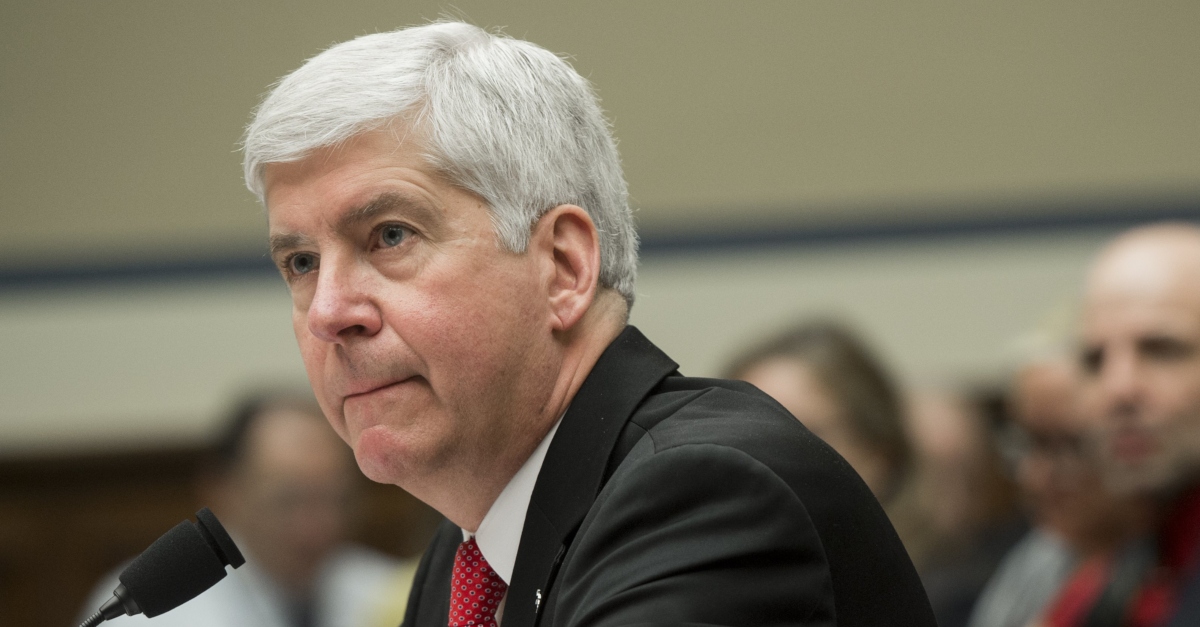
A Genesee County, Mich. district court judge on Thursday refused to throw out criminal charges against former Michigan Gov. Rick Snyder (R) connected to the City of Flint’s water crisis.
Judge William Crawford II of the state’s 67th District Court disagreed with defense assertions that the court lacked jurisdiction to hear the matter and that the specific court being used to press the litigation constitutes an improper venue.
Snyder is charged with two counts of willful neglect of duty under Michigan law. The former governor moved to quash and dismiss the charges by challenging the way he was charged and by arguing that “none of his alleged failures to act occurred in the City of Flint,” Judge Crawford noted while recapping the litigation.
“There is no dispute that pursuant to statute a single-county grand juror has authority to investigate and charge crimes committed within his jurisdiction” under Michigan law, Judge Crawford said in response to those arguments. “Here, Judge Newblatt was sitting as a single-judge grand juror in Genesee County who upon finding probable cause, has authority to issue and return an indictment within his jurisdiction.”
“Since the only county listed, Genesee County, is within the grand juror’s jurisdiction, multicounty jurisdiction is not invoked, and therefore the motion to quash is denied,” Crawford ruled.
He next tackled the issue of whether venue was improper.
In brief, Snyder argued that Lansing, the state capitol, was the “seat of power” where his legal duties arose and, thus, was a better venue. Snyder also lives in Lansing.
Judge Crawford suggested that a poorly written statute was the root of the dispute:
The parties agree in general, that venue is proper in the county where the crime was committed. (Citation omitted.) The instant charges of Willful Neglect of Duty have honed a sharp dispute regarding the location of the alleged crimes. The parties spar over the dissection of the “essential verb” in the controlling statute MCL 750.478 and not surprisingly reach opposite conclusions on whether the duties at issue are specific enough to constitute a duty ‘enjoined by law.’
The state argued that Snyder had to contact and supervise officials in Flint and, thus, had sufficient connections to that city to be tried there.
“The People also note that the offense of willful neglect of duty is a crime of omission, in that the offense is based upon the failure to act, rather than a wrongful act that was taken,” Crawford noted.
The judge then waded through a series of persuasive — but not entirely on point — statutes which allow certain cases to be tried in multiple counties.
Crawford said that it appeared to him “that the state legislature does not want strict adherence to territorial boundaries applied to nebulous concepts of venue in such a fashion as to potentially impede justice.”
Flint is about an hour away from Lansing.
Crawford then wrapped up:
The grand juror has returned an indictment that lists the place of offense as the City of Flint. The Attorney General, with intimate knowledge of investigative information has owned this designation of locus delecti and has declared that they are prepared to prove venue at trial beyond a reasonable doubt in Genesee County.[ . . . ][T]he unique application of duties, actions and inactions allegedly exercised in the City of Flint by certain state actors — department heads, emergency manager(s), and their designees and subordinates alleged to be subject to the oversight and supervision of Defendant Snyder during the relevant time periods in this matter.For these reasons and those stated above, the court finds that the situs of the crime and venue could be proper in Genesee County as a matter of law, Defendants motion to dismiss is denied[.]
The officials who are pressing the case on behalf of the state were pleased.
“Today’s ruling is a small victory for the people of Flint who patiently await their day in court,” said Michigan Solicitor General Fadwa Hammoud via a press release disseminated by the office of Attorney General Dana Nessel. “This ruling affirms what our team has argued from the beginning: that the use of the grand jury to investigate and bring charges against Mr. Snyder and others as part of the Flint water crisis was proper.”
“The defense has said that ‘neglecting a city is not a crime,'” said Wayne County Prosecutor Kym Worthy. “On behalf of the citizens of Flint, we vehemently disagree with the notion that public officials are entitled to show little regard for the health and safety of the people they are elected to serve.”
The charges Snyder faces are both misdemeanors. Each could land him in jail for up to a year or fined up to $1,000.
Eight other officials are also charged.
[image via SAUL LOEB/AFP/Getty Images]